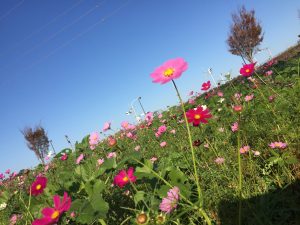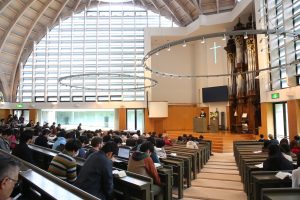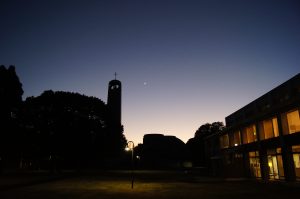Student Life
At TCU, all students are required to live on campus. TCU believes that Christian education extends to living as well as to thinking. Therefore, the university considers dorm life a part of education in International Christian living. With less than 200 students, TCU’s dorms are close-knit families with internal responsibilities and events.
Within the limits of Japanese law and the general guidance of the faculty, the students govern themselves and set their own rules and regulations. Currently, for example, the students have imposed a campus curfew. Although only the women’s dorm currently enforces it, men and women are expected to be in their dorms by eleven in the evening.

The men and women have separate dormitories. Aside from special occasions, men are not allowed to visit in the women’s dorm, nor women in the men’s dorm.
In Japan, most schools require the students to help clean and maintain the campus facilities. TCU has incorporated that Japanese tradition into its educational practice. All students, in the spirit of Christian concern for each other, share in maintaining the dorms and take turns washing dishes in the cafeteria.
Students also take a central role in school events by participating in committees. Each student is required to join one committee. The current committees for ACTS Students include Student Council, Zion Festival, Spring Retreat, Prayer Meeting, and Summer Missions.
There are many on-campus opportunities to participate in music groups, choir, clubs (called “circles”), concerts, intramural athletic events, exercise, or prayer groups. In addition, students are encouraged to explore the vast cultural resources in the Tokyo area, such as the innumerable museums, concerts, dramatic productions, art exhibits, technical shows, public lectures, and sporting events.
Students in the ACTS-ES program are permitted to work while at TCU. The Japanese government allows the holder of a “college student” status of residence to work up to 28 hours per week. Permission to work part-time requires an additional application to the government. The university will assist the student in making this application. Part-time work may be off-campus. Since the primary purpose of the ACTS- ES program is to educate students, the university normally places additional restrictions on the number of hours an ACTS- ES student may work, typically no more than ten hours per week when the university is in session.
However, job opportunities are very limited before the student gains reasonable Japanese communication skills. The university does not function as an employment agency, and students must find part-time jobs on their own. That being said, ACTS- ES students who want part-time work have normally found it, especially after acquiring “reasonable Japanese communication skills.” Some of the jobs international students have found include newspaper delivery, dish washing, and teaching English.
 TCU’s campus is safe, clean, and spacious, located in a pleasant, well-planned neighborhood with broad streets, safe sidewalks, parks, private homes and condominiums, some shops, another university, several training campuses for Japan’s largest corporations, and highly competent police, fire, and medical services. It has convenient train access to the rest of the Tokyo area, including Narita International Airport and Tokyo’s central business sectors, such as Asakusa and Ginza.
TCU’s campus is safe, clean, and spacious, located in a pleasant, well-planned neighborhood with broad streets, safe sidewalks, parks, private homes and condominiums, some shops, another university, several training campuses for Japan’s largest corporations, and highly competent police, fire, and medical services. It has convenient train access to the rest of the Tokyo area, including Narita International Airport and Tokyo’s central business sectors, such as Asakusa and Ginza.
TCU requires all international students to register for Japanese National Health Insurance. The university will help the student through the registration process. This is excellent insurance with a very broad and high level of coverage. Please note, however, that coverage is limited, for all practical purposes, to Japan. If for any reason, the student travels outside Japan, it is the student’s responsibility to find and purchase adequate health insurance during that travel.
No alcohol or smoking is allowed on campus or at activities sponsored by the university or by any student group. Although it goes without saying, students should note that illegal drugs and other substances are banned.


